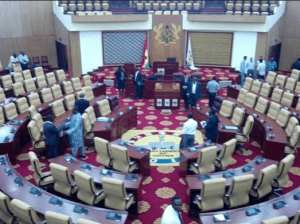Parliament looks to establish Geological Survey Authority
 Parliament is considering legislation that would empower the demolition of a number of houses and other structures along the Accra-Cape Coast main road that are close to earthquake fault lines.
Parliament is considering legislation that would empower the demolition of a number of houses and other structures along the Accra-Cape Coast main road that are close to earthquake fault lines.
The legislation will seek to reduce the impact of disaster-related to earthquakes, volcanic and other seismic activities throughout the country.
Ghana has major earthquake fault lines stretching from the McCarthy Hill area in Accra westwards towards the Central Region and Eastwards towards the Akuapim Ridge all the way to the Volta Region.
The epicentre of the fault line is thought to be located around the McCarthy-Weija Dam catchment area.
The legislation called the Ghana Geological Survey Authority Bill is to establish the Ghana Geological Survey Authority with the mandate to advise government on geo-scientific issues relating to mineral resources, environment and hydro-geology.
In a contribution to adopt the Committee’s report, the Minority Leader Osei Kyei-Mensa-Bonsu, expressed concern about the scarcity of recent legislation to guide land planning and use in the country.
He said the nation had to get its act together to deal with the unbridled estate and ancillary developments along the epicentre and fault lines of Ghana.
He said it appeared that nobody cared about the impunity of such developments: “Only God knows what would happen in the event of any major seismic activity.”
Mr Kyei-Mensa-Bonsu noted the lack of geo-scientists in Ghana was also a challenge to the operations of the Geological Services Department (GSD), explaining that, there were only two geo-physicists at the Department.
He asked for better remuneration for the staff at the Department to stem their exodus for greener pastures, as efforts were also made to place emphasis on further training for the staff of the institution.
The Deputy Majority Leader and MP for Ashiaman, Alfred Agbesi, said the intellectual property of the GSD should be well protected.
The Bill also seeks to promote standards of professional conduct and efficiency in geological matters, effective dissemination of information on geological hazards and to ensure the effective exploration and exploitation of mineral resources.
The GSD, which would see transformation if the Bill is passed, was established in 1913 by the British Colonial Administration as the Gold Coast Geological Survey, then.
The functions of the Department at the time included advising the colonial administration on geo-scientific issues related to oil and gas, geological mapping, hydro-geology, engineering geology, and earthquake monitoring among others.
According a Report of the Select Committee on Mines and Energy on the Bill, despite its significant contribution to the development of the country, the Department continues to content with a number of challenges due to financial constraints.
The Department’s source comes from the Government through annual budgetary allocations, which the report notes has proved to be inadequate with attendant late releases.
“The financial difficulties continue to undermine the work of the Department and have led to low remuneration, which does not attract the right calibre of technical personnel to discharge the highly technical functions charged to the department, and is also leading to the exodus of qualified and experienced staff and this has adversely impacted on the work of the department,” the report says.
The report states that the challenges of the Department in the face of the great potential of the GSD makes it necessary to convert it into a semi-autonomous body, and bring it into conformity with recent legal requirements.
Among the provisions of the Bill are those regarding funding for the Authority, protection of the Authority’s intellectual activity, foreign activities, including empowering the Authority to expand its activities outside the country by undertaking consultancy services for foreign clients for a fee.
It also provides for a governing body to ensure the effective performance of the functions of the Authority.
Source: GNA
